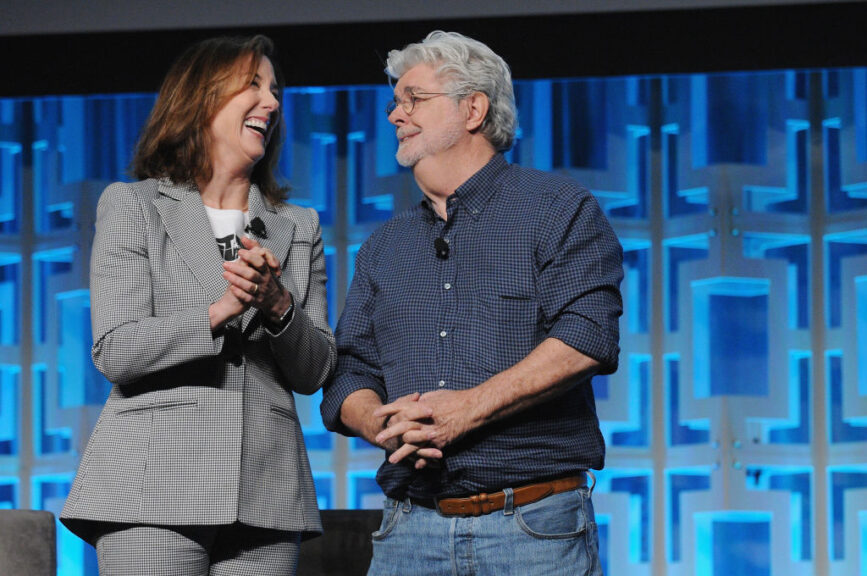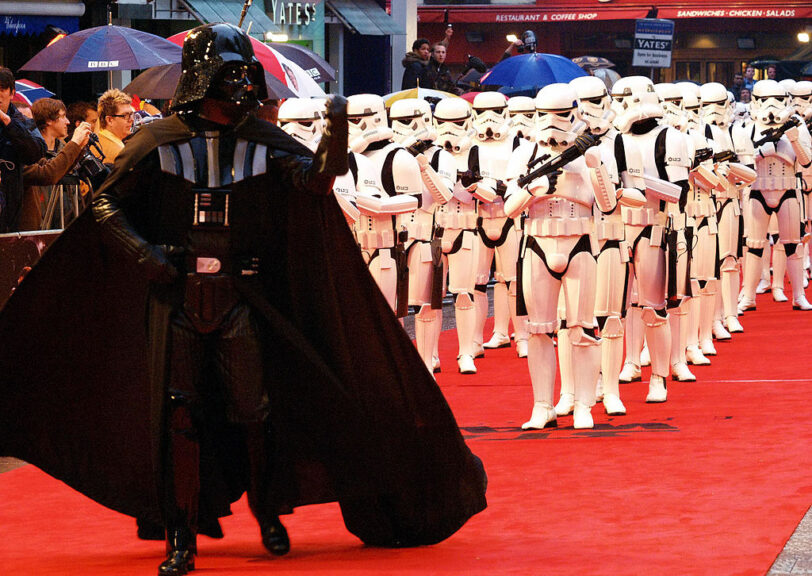When Disney’s new generation of “Star Wars” writers resurrected the evil Emperor Palpatine so that a female Jedi could be the new hero, they not only lost much of their fanbase, they also ruined the overall story.
Shortly after Disney purchased “Star Wars” from George Lucas in 2012, the new president of Lucasfilm, Kathleen Kennedy appeared in an interview with Lucas where she claimed, “The main thing is to protect these characters. Make sure that they continue to live in the way that you created them.”
As the resurrection of Palpatine shows, that wasn’t the case.

Gerardo Mora/Getty Images for Disney
From Padme Amidala in “The Phantom Menace” to Cal Kestis in “Jedi: Fallen Order,” under both Lucas and Disney, “Star Wars” has introduced a rich array of characters who have captured the hearts of fans. It’s crucial to recognize, however, that all of these characters orbit around the saga’s central figure: Anakin Skywalker.
Anakin Skywalker’s journey begins with 1999’s “The Phantom Menace.” Skywalker is discovered by the Jedi and thought to be the prophesied “Chosen One” destined to bring balance to The Force by defeating the evil Sith.
As the trilogy progresses, Anakin emerges as a teenage Jedi Knight, showcasing his formidable strengths such as raw power and dueling skills. However, amidst these displays of prowess, a significant weakness comes to light – his susceptibility to his emotions. Anakin’s descent into emotional turmoil leads him to defy the Jedi code by secretly marrying Queen Padme Amidala, a decision that would eventually lead to his downfall.
In the concluding chapter of the prequel trilogy, “Revenge of the Sith,” Anakin, now 22-years-old, succumbs to the allure of the dark side. Exploiting his emotional vulnerability, the malevolent Sith Lord Palpatine manipulates Anakin by leading him to believe Padme is facing certain death due to childbirth.
Left helpless on the matter by the Jedi and desperate to save his beloved, Anakin embraces Palpatine’s promise of a power that can guarantee her safety. He transitions into the infamous Darth Vader, perpetrating the massacre of the Jedi Order, the very institution that nurtured him.
The Original Trilogy focuses on Anakin’s son, Luke, who is determined to redeem his father. In “Return of the Jedi,” Vader fulfills the prophecy by saving his son and killing Palpatine. This pivotal moment is the perfect conclusion to Anakin’s story.
As George Lucas himself put it, “Anakin is very different in the end. The thing of it: The prophecy was right. Anakin was the Chosen One, and he does bring balance to The Force. He takes the ounce of good still left in him and destroys the Emperor out of compassion for his son.”

MAX NASH/AFP via Getty Images
Decades later though, Disney’s writers decided the ending wasn’t concrete. In 2015, they launched a new trilogy with “The Force Awakens,” introducing Mary Sue character, Rey, as the central protagonist. Despite having a severe lack of training, her power was comparable to many Jedi masters before her.
Disney’s “Star Wars” writers do not shy away from their intent to reflect a feminist worldview. Back in 2015, director Sharmeen Obaid-Chino spoke at a Women in the World event. At this event, she claimed that her goal is to “make men uncomfortable.”
Here’s the feminist director of the next Star Wars film saying that her goal is to “make men uncomfortable.”
This movie is destined to be Disney’s biggest flop yet. pic.twitter.com/KaihbiA7Oj
— Matt Walsh (@MattWalshBlog) January 3, 2024
The trilogy truly hit rock bottom with its final film, “The Rise of Skywalker,” where Anakin’s redemptive sacrifice was rendered void. Emperor Palpatine was unexpectedly revealed to be alive, with an initial explanation that was widely criticized by fans. In a one line bombshell, Resistance pilot Poe Dameron claimed “Somehow Palpatine returned.”
“Somehow… Palpatine returned” will go down in history as the worst line in Star Wars history https://t.co/aiytJ3zjYC
— marina! (@_marinaharrison) May 4, 2023
Disney’s new trilogy met its climax with the now unfulfilled prophecy being completed by Rey, who kills Palpatine once and for all.
Aside from the writing in that specific movie, political correctness has been an issue in the “Star Wars” universe at large. Just days ago, actress Gina Carano announced on X that after three years she is filing a lawsuit against both Lucasfilm and Disney for her firing from “The Mandalorian.”
The firing stemmed from her resharing a post that drew parallels between the political climate at the time and Nazi Germany.
According to the complaint filed in federal court: “A short time ago in a galaxy not so far away, Defendants made it clear that only one orthodoxy in thought, speech, or action was acceptable in their empire, and that those who dared to question or failed to fully comply would not be tolerated.”
In addition to the mishandling of Anakin’s legacy, numerous other flaws in the writing have been highlighted by those deeply invested in the story. Mark Hamill, renowned for his portrayal of Luke Skywalker in both the Original Trilogy and Disney’s sequel trilogy, expressed dissatisfaction with how his character was depicted. Hamill criticized the portrayal, stating, “He’s not my Luke Skywalker.”
When it comes to “Star Wars” — a franchise boasting perhaps the most devoted worldwide fan base — every aspect of the writing should be meticulously crafted. However, instead of enlisting passionate fans capable of distinguishing between real-world politics and the fictional “galaxy far, far away,” Disney persists in allowing politically charged progressives to shape storylines.
Unless a retcon of Disney’s sequel trilogy materializes, the story of Anakin Skywalker, which fundamentally embodies the saga of “Star Wars,” stands tarnished. For this, Disney’s actions should be deemed unforgivable by fans.
* * *
Jacob Falach is a writer and student in Nashville, TN. You can find him on Instagram at: @jacobfalach
The views expressed in this piece are those of the author and do not not necessarily represent those of The Daily Wire.

Continue reading this exclusive article and join the conversation, plus watch free videos on DW+
Already a member?

.png)
.png)

